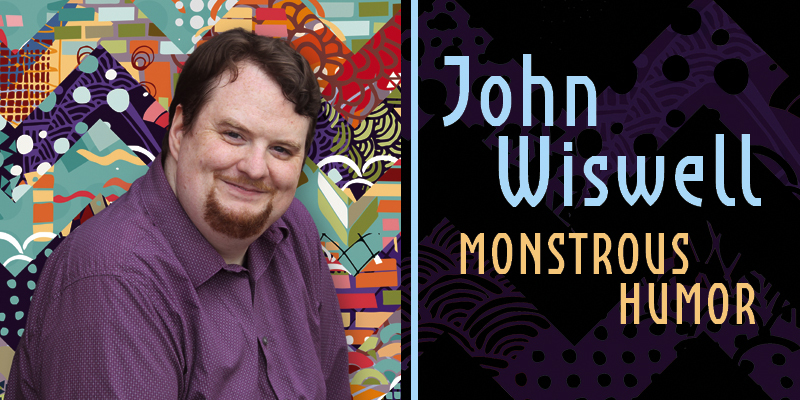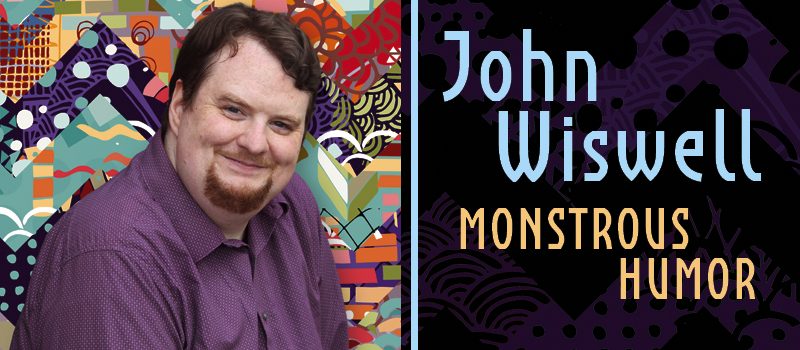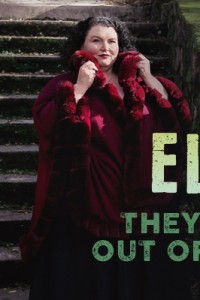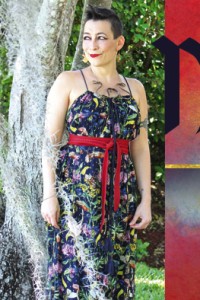John Wiswell: Monstrous Humor

JOHN CORCORAN WISWELL was born September 4, 1981, and grew up around the Mount Kisco area of New York State. He attended Bennington College, graduating in 2005, and went to the Viable Paradise writing workshop in 2013. Wiswell has multiple disabilities, including a neuromuscular syndrome, and often explores disability issues in his fiction.
His first SF story, “Alligators by Twitter”, appeared in 2010, and he has since published around 40 stories, many in major magazines. Notable works include Nebula Award winner and Hugo and World Fantasy Award finalist “Open House on Haunted Hill” (2020); British Fantasy Award finalist “8-Bit Free Will” (2020); Locus Award winner and Hugo and Nebula Award finalist “That Story Isn’t the Story” (2021); Nebula Award finalist and Locus Award finalist “For Lack of a Bed” (2021); and Hugo and Nebula Award finalist “DIY” (2022).
His debut novel, Someone You Can Build a Nest In, is forthcoming in April 2024.
Excerpt from the interview:
“The title of my upcoming book is Someone You Can Build a Nest In. I feel like, especially in the last four years, I’ve indulged more nonhuman points of view, and those have become these great reflections on humanity and marginalization, whether it’s the queer or disabled or fat or poor experience, whatever. Those vibrate through: ‘Open House on Haunted Hill’ is telling the story through the POV of the haunted house. ‘Foreign Tongues’ is an alien paleontologist that thinks ice cream is the dominant force of intelligence on Earth, because it communicates through taste, so it doesn’t understand or care about our language. Just playing with different POVs definitely loosened up this novel idea, because I’d always wanted to write a book from the POV of a monster, but the stories sharpened my skill set to let me really dive deeper into the internal life of something that lives largely in isolation, and that has a bunch of defensive half-truths about humanity that are about to be challenged. It gets to go much deeper, and it gets to be much more character growth, much more nuanced, including exploration of isolation, and that absolute terror at, ‘Wait, I might like being around people, but that goes against my identity!’
“My path to publication was arduous. It took me a very long time to get to this book. Hannah Bowman, who is my current agent, actually rejected two of my books before this one, and both times, she was like, ‘This isn’t right for me, but if this doesn’t land you an agent, send me your next thing.’ The second time we talked, she said, ‘You’re the guy who wrote so-and-so’ and I was like, ‘Yeah, I’m the only person who would have written that kind of thing.’ She remembered me, and my weird penchants, and especially my emphasis on humanizing bizarre creatures – or, at least, imbuing them with sympathy. Not to make the mistake that animal life is necessarily human intelligence – they aren’t exactly us, even if we project onto them.
“With this book, I was like, ‘I’m just going to write my own self. I’m going to write some secluded, disgusting, disabled monster. It’s going to deal with how disabled people have to present themselves and feel like they have to hide symptoms. I get to use the lens of monstrosity, because I’m always fascinated with how monstrosity is often just a metaphor for people being uncomfortable around disabled people.
“I wrote my heart into it. That wound up being how I spent the first six months of the pandemic, and that was the book that Hannah wanted. I got a few offers of representation for it, but Hannah was the right choice, I felt, because she understood so much of what was going on under the hood, including the weird sense of humor and the satirical elements, but also the genuine, confused love story, the idea of, ‘Wait, I’m capable of connecting? I’ve built my identity around not connecting because that defended me. But, if you can have connection in this world, what do you do? I thought it was too late.’ She got it so wonderfully. That was the path for me. It took a lot of novels to get the experience level to write what I want to be writing now. But it was all worth it.
“The thing that vibrates the core of Someone You Can Build a Nest In is both the hilarious and the heart-wrenching dynamic of wanting to be vulnerable with someone who’s been hurt. The core premise of the book is: Shesheshen is a shapeshifting, horrible nightmare lady who has always been hunted. She falls off a cliff, she thinks this is it and she’s dead, she wakes up, and someone is caring for her. For the first time in her life, a human being has done something good for her, and that’s because this lady, Homily, thinks Shesheshen is a human victim of the monster, because the shapeshifter has taken a human form. So Shesheshen gets nursed back to health by this human and she’s like, ‘Well, she’s feeding me, so I guess I won’t eat her until tomorrow. What’s going on here?’ They get closer and closer together and then Shesheshen realizes, ‘Oh, this is some weirdo who I can actually connect with – this is a human who doesn’t automatically default to harming me, to wanting to drive me out.’ And realizing, then, that Homily is shut out of society, too – ‘Oh, she is like me. I need to be there for her. I’m going to tell her: She’s made a mistake, I’m not human, and then we’re going to make this work.’
“She’s about to tell Homily who she really is when Homily says, ‘By the way, I’m here hunting for this terrible monster – do you know where it is?’ Shesheshen is torn apart, like, ‘Goddamn! But I love her! How do I get around this?’ Homily says, ‘Yeah, this terrible monster cursed my family.’ Shesheshen is like, ‘I don’t even know how to curse people!’ So she’s got to pursue this: Is there a possibilityof solving this? Every moment that she spends trying to understand where Homily’s coming from, she’s putting herself at risk – both physical and emotional. It’s that tremulous balance because Homily does seem to be a compassionate person in a way that Shesheshen has never encountered, and the desire to just be genuine in public is overwhelming to her. ‘I could just be myself, even with one person?’ That’s attractive in a way she’s never found. That desire to be yourself with at least one other person is what’s vibrating at the core.
“We’re getting into spoilers, because the most challenging points are later in the book. But it turns out that a lot of Homily’s generosity might not come from a positive place, but be the response to having been hurt as well. Then Shesheshen has to consider, ‘The thing I found attractive about you is more complex than I thought, and that’s a context I need to take care of that I don’t understand.’ The push and pull with Homily over where her boundaries are and where they should be, through the eyes of someone who loves her and is afraid of her, was the most challenging but also the most rewarding part to write, because that’s where you get to explore all of these vulnerabilities they wind up sharing. It was the most challenging, but it was the most enticing, as well.
“Their dynamic is why I wrote the book. Before I had a plot, I just had ‘Shapeshifting monster has to try to pretend to be normal to impress a nice girl.’ I had a relationship dynamic, and then it poured out onto the page. Just having these two play off of each other and expand as people was so fun. How are you going to draw the reader along? Can she confess yet? Who gets in the way, who else is coming after the monster, who is manipulating Homily from other ends – and can everybody just look the other way and I’ll just eat her mom really fast? There are a lot of those vibes.
“The more you find out about a person, the more complex the conflicts are. You think it’s very simple, as if: ‘I’ll tell the monster hunter that I didn’t curse her.’ But within a few days of knowing her life context, it’s not even close to that simple. Emotional honesty is hard, right? And safe boundaries are hard.
Interview design by Stephen H. Segal.
Read the full interview in the September 2023 issue of Locus.
 While you are here, please take a moment to support Locus with a one-time or recurring donation. We rely on reader donations to keep the magazine and site going, and would like to keep the site paywall free, but WE NEED YOUR FINANCIAL SUPPORT to continue quality coverage of the science fiction and fantasy field.
While you are here, please take a moment to support Locus with a one-time or recurring donation. We rely on reader donations to keep the magazine and site going, and would like to keep the site paywall free, but WE NEED YOUR FINANCIAL SUPPORT to continue quality coverage of the science fiction and fantasy field.
©Locus Magazine. Copyrighted material may not be republished without permission of LSFF.







